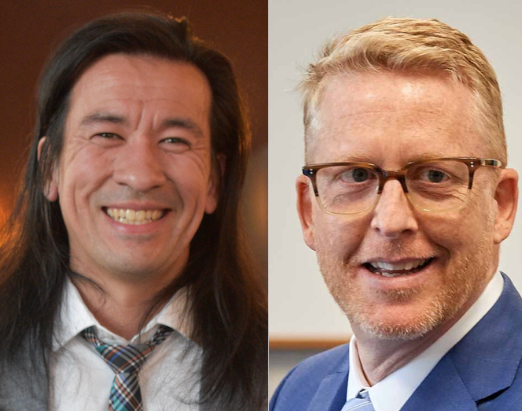Two UConn professors have been appointed to the newly-formed Connecticut Hate Crimes Advisory Council by Governor Ned Lamont, while both the co-chairs of the council are UConn Law graduates.
The council, which has 25 total members, will be responsible for encouraging and coordinating programs that increase community awareness, the reporting of hate crimes, and efforts to combat such crimes. It also can make recommendations for legislation concerning hate crimes, including recommendations on restitution for victims, community service designed to remedy damage caused by any such crime, and alternative sentencing programs for first-time offenders and juvenile offenders.
Jason Chang, the director of the Asian and Asian American Studies Institute at UConn and an associate professor of history and Asian American studies, and Richard Wilson, the Gladstein Chair and Professor of Anthropology and Law and the Associate Dean for Faculty Development and Intellectual Life at the UConn School of Law, were both named to the council.
“Nobody should ever have to fear being the victim of a crime for being the person they are, and it is unconscionable that people continue to be targeted throughout our country because of the color of their skin, the religion they practice, the person they love, their country of birth, or any other personal attributes that identify who they are,” Governor Lamont says. “I appreciate the willingness of this diverse group of members who have volunteered to serve on this council and deliver their insights so that we can establish policies that prevent these crimes from happening in the first place and ensure the appropriate actions are taken in the event that we are faced with crisis in the future.”
Connecticut appellate court judge Douglas Levine ’77 JD and Connecticut Bar Association president Amy Lin Meyerson ‘94 JD are co-chairs of the council. Michael Bloom ’98 (CLAS), the executive director of the Jewish Federation Association of Connecticut, is also a member.
Chang, who is also a member of the West Hartford Board of Education, has extensive experience in anti-racism activities and addressing violence against Asians-Americans. He believes that hate crimes legislation and the prosecution of hate crimes can only do so much, because they address problems after they happen. Chang also wants to address transphobia and gender-based violence as part of his work on the council.
“One of the things I have really been pushing for is educational reform, and that is something that has to be part of the conversation,” says Chang. “I hope to take the focus off of perpetrators and on to the safety and security of communities. I definitely believe in accountability, but want to take care of the people who are hurting.”
He believes that the hate speech of today is reminiscent, “almost word for word,” of what was common in the 1880s, when the Chinese Exclusion Act was introduced, and the 1920s, when the United States created a eugenics-based immigration system.
“Right now is the time when change can have the most impact – when we are reopening schools, when we are recharging the economy, bringing people back to work, and trying to figure out what the path forward is going to look like,” says Chang. “I don’t want it to look like the way it did in 2019; our outlook has to be different, what we do has to be different. This is a moment we really have to seize.”
Wilson, who has worked on human rights issues since the 1980s, wrote a book in 2017 entitled “Incitement On Trial: Prosecuting International Speech Crimes,” which explains why international criminal tribunals struggle to convict individuals for inciting speech and proposes a new model of prevention and punishment.
“The question of hate speech and hate crimes has been a life-long interest to me,” says Wilson. “It particularly arose when I was doing research on the international criminal courts and the tribunals from Rwanda and the former Yugoslavia. There were a number of convictions for hate speech, and also incitement of people for genocide. I became very interested in holding inciters criminally responsible for participating in mass crimes in no other way but inciting others, who then go on to commit the crimes.”
Wilson believes that, despite the current polarized political environment, the issue of hate crimes should be non-partisan.
“No one gains from having religious, racial, ethnic, or sexual communities, communities of disabilities, being targeted and attacked throughout our country,” says Wilson. “I am hoping we can build a broad coalition to address these topics in Connecticut.”



